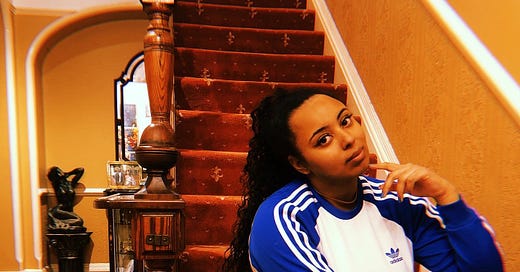Banseka Kayembe: “The world sees and treats me as Black”
The writer shares how her identity has come full circle and advice for parents of mixed children
Hi, welcome back to Mixed Messages! This week I’m speaking to Banseka Kayembe, who is of Indian and Black heritage. Banseka is the Director of Naked Politics, and has spoken frequently about her mixed identity and identifying as Black. I first met Banseka when we shot for mixedracefaces, so I was excited to catch up with her and hear how her identity has shifted in light of a tumultuous year.
How do you define your ethnicity?
I’m mixed Indian and Black, but I talk about myself as a Black person. I’m not trying to erase the fact that my mum is Indian, but I don’t feel 50/50. The social reality of what happened last year with Black Lives Matter put the hurdles and difficulties Black people face into sharp focus, and the Black experience is closest to my own.
Has your identity shifted over time?
I’ve come full circle. In the past, I identified as Black because that was how I was raised. My parents understood that though their kids had two heritages, the world would ultimately see us as Black and treat us accordingly.
A few years ago, I took part in mixedracefaces (Mixed Race Faces) and met someone with a similar mix to mine. They were Pakistani and Trinidadian, and it caused me to think about my mixed identity. I started to question what it would mean for me to also feel Indian. Growing up, my mum made Indian food and spoke Punjabi, so I had those experiences, but I also had to come to terms with how common anti-Blackness is in Indian communities.
Then when Black Lives Matter became a worldwide topic very quickly, despite police brutality happening for decades, it sharpened that I’ll always feel most comfortable in the Black community. They always see me as one of them, so I came back to seeing myself as Black. I’ve still got my mixed Indian heritage, but I feel proud to be part of the Black community.
Did you experience anti-Blackness in your family?
It was only really my mum’s dad who had a problem, but he passed when I was young so I wasn’t ever aware of this until I was older. If I saw more people in the Asian community speak out against anti-Blackness, I might feel more comfortable in that space and not have to shield myself as much.
Can you relate to this idea of a ‘third culture’?
For people who grew up coming from one culture and move here to a different one, there’s always going to be a level of tension.
I think it’s a similar experience for immigrant children as well as mixed people, this tension between the approach our parents might want to take to life, and what we might want to do. I was always aware that my parents were from two different cultures and for a while that was probably a source of frustration for me.
Should mixed people define themselves on their own terms?
I don't agree with telling mixed people how to identify. People will come to their own conclusions based on their own experiences, and it’s important for that to be respected. I’ve chosen my path in terms of my identity, but that’s not to say someone with a similar mix to me shouldn’t phrase themselves differently.
Do you have any advice for parents of mixed children?
One day your child could turn around and say “I only identify as x”, and you’ll have to accept, embrace and respect that. If they want to be balanced, that’s great as well. Let them go on their own journey and don’t be alarmed if a big moment changes their sense of identity.
If you could define your experience in one word, what would that be?
Socialised. My political and social experiences have been more important in determining my racial identity than anything else.
Editor’s note: Banseka clarified on her Instagram that “although as a Black mixed heritage/ race person I can still claim being Black, that doesn’t mean that I have all the same experiences as monoracial Black people, especially those who are dark skinned… It’s extremely important to highlight as Black people we’re not all in the same boat.”
Follow Banseka here, and Naked Politics here. Next week, I’ll be talking to Georgina Lawton, author of Raceless. Subscribe to get this unmissable edition of Mixed Messages in your inbox next Monday!
Enjoy Mixed Messages? Consider supporting me on Ko-Fi so I can continue to grow this newsletter!
Mixed Messages is a weekly exploration of the mixed-race experience, from me, Isabella Silvers. My mom is Punjabi Indian (by way of East Africa) and my dad is White British, but finding my place between these two cultures hasn’t always been easy. That’s why I started Mixed Messages, where each week I’ll speak to a prominent mixed voice to delve into what it really feels like to be mixed.







